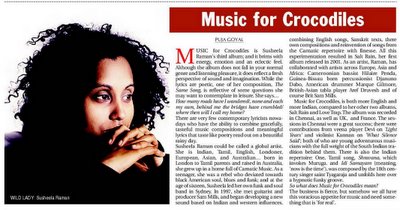Music for Crocodiles
 Source: Vijay Times, BVT LifeStyle - 4.
Source: Vijay Times, BVT LifeStyle - 4.Copyright © 2005 Puja Goyal.
Music for Crocodiles is Susheela Raman's third album; and it brims with energy, emotion and an eclectic feel. Although the album does not fall in your normal genre and listening pleasure, it does reflect a fresh perspective of sound and imagination. While the lyrics are poetic, one of her composition, The Same Song, is reflective of some questions she may want to contemplate in leisure. She says…
How many roads have I wandered/ none and each my own/ behind me the bridges have crumbled/ where then will I call my home?
There are very few contemporary lyricists nowadays who have the ability to combine gracefully, tasteful music compositions and meaningful lyrics that taste like poetry read out on a beautiful rainy day.
Susheela Raman could be called a global artist. She is Indian, Tamil, English, Londoner, European, Asian, and Australian… born in London to Tamil parents and raised in Australia, she grew up in a home full of Carnatic Music. As a teenager, she was a rebel who deviated towards black American soul, blues and funk; and at the age of sixteen, Susheela led her own funk and soul band in Sydney. In 1997, she met guitarist and producer Sam Mills, and began developing a new sound based on Indian and western influences, combining English songs, Sanskrit texts, there own compositions and reinvention of songs from the Carnatic repertoire with finesse. All this experimentation resulted in Salt Rain, her first album released in 2001.
As an artist, Raman, has collaborated with artists across Europe, Asia and Africa: Cameroonian bassist Hilaire Penda, GUINEA-Bissau born percussionist Djanuno Dabo, American drummer Marque Gilmore, British-Asian tabla player Aref Druvesh and of course Brit Sam Mills.
Music for Crocodiles, is both more English and more Indian, compared to her other two albums, Salt Rain and Love Trap. The album was recorded in Chennai, as well as UK, AND France. The sessions in Chennai were a great success; there were contributions from Veena player Devi on Light Years and violinist Kannan on What Silence Said; both of who are young adventurous musicians with the full weight of the South Indian tradition behind them. There is also the Indian repertoire: One, Tamil song, Shravana, which invokes the South Indian god, Muruga. Two, Idi Samayam (meaning, 'now is the time'), was composed by the 18th century singer saint Tyagaraja and unfolds here over a hypnotic funky groove.
So what does Music for Crocodiles mean?
The business is fierce, but somehow we all have this voracious appetite for music and need something that is for real.
(click on image to read article)

Comments